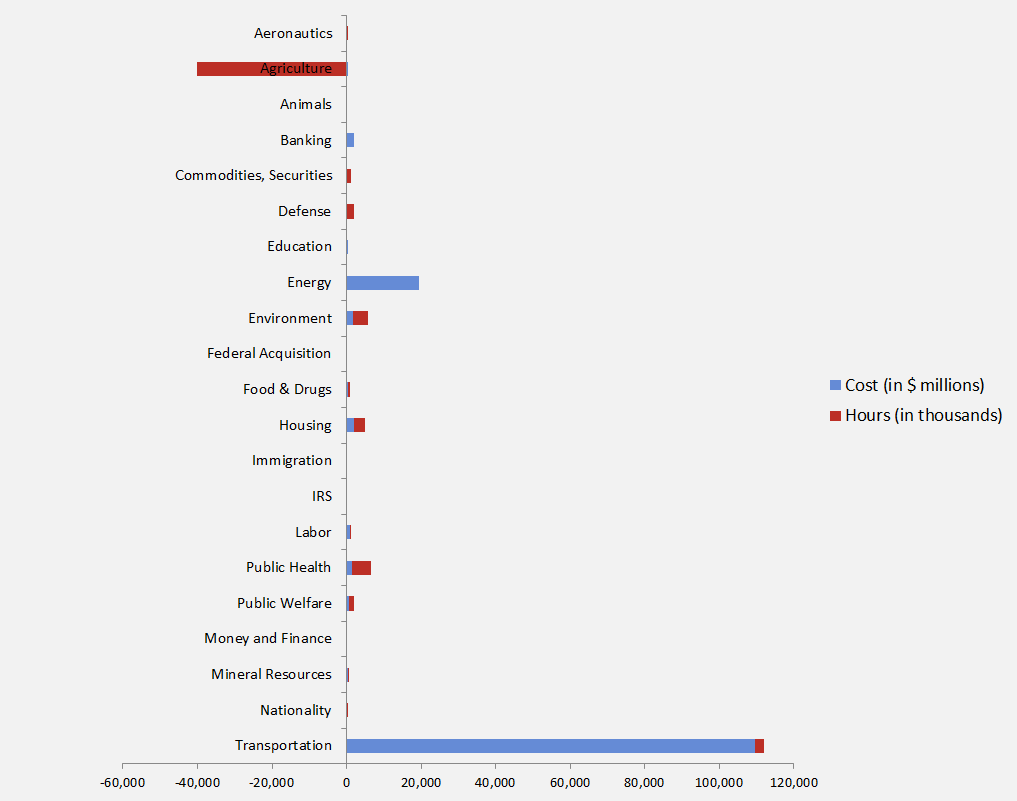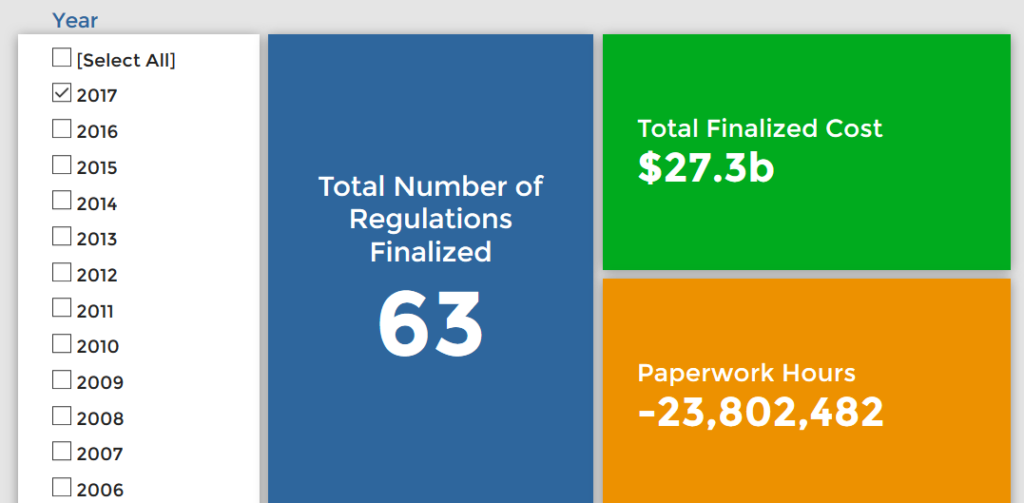Week in Regulation
March 20, 2017
Reform Path Continues
Once again, the Federal Register was quiet this week, with $66 million in total costs and 950,000 paperwork burden hours. The Securities and Exchange Commission did publish three notable rulemakings. Yet, Congress and the Trump Administration were busy once again examining recent rules from the previous administration. The per capita regulatory burden for 2017 is $429.
Regulatory Toplines
- New Proposed Rules: 25
- New Final Rules: 55
- 2017 Total Pages of Regulation: 14,318
- 2017 Final Rules: $27.3 Billion
- 2017 Proposed Rules: $111.6 Billion
The American Action Forum (AAF) has catalogued regulations according to their codification in the Code of Federal Regulations (CFR). The CFR is organized into 50 titles, with each title corresponding to an industry or part of government. This snapshot will help to determine which sectors of the economy receive the highest number of regulatory actions.
Aside from airworthiness directives, the Securities and Exchange Commission (SEC) was the only active regulator. It published two proposed and one final regulation this week. Unsurprisingly, the final rule, “Exhibit Hyperlinks and HTML Format,” requires registrants that file statements to submit findings in HTML format. This seemingly routine measure will cost $43 million annually and impose more than 390,000 burden hours.
The two proposed rules address XBRL filing of data and “Municipal Securities Disclosure.” The XBRL measure actually reduces paperwork by more than 80,000 hours, with negligible costs. The municipal securities proposal imposes $22 million in costs and more than 640,000 paperwork burden hours.
Tracking Regulatory Modernization
This week the administration formally signaled its intention to review and possibly amend CAFE vehicle standards for 2022 to 2025 model years. According to a recent AAF paper, the costs of the last round of standards could total $4.2 billion. Looming for next week is a decision on the Clean Power Plan, methane regulation, and the social cost of carbon.
After passing four CRA resolutions of disapproval last week, the Senate followed up with another repealed rule for drug testing unemployment compensation applicants. The Department of Labor did not provide an estimated cost for the rule.
Last week the Senate repealed the Contractor Blacklisting rule ($872 million in total costs), a Resource Management measure, a regulation on Teacher Preparation Issues ($278 million in costs), and a rule on State Plans ($73 million in costs) from the Every Student Succeeds Act. The teacher preparation rule received a fair amount of bipartisan support, as eight Democrats supported the repeal. Look to those eight Democrats for any chance of passing a more comprehensive regulatory reform package this Congress.
As of this writing, the House and Senate have both voted to overturn eight regulations, detailed here. President Trump has signed three measures, which means there are five CRA resolutions awaiting formal approval. Once signed, Congress and the administration will have eliminated $3.7 billion in total regulatory costs and 4.2 million paperwork burden hours. There are six additional House CRA approvals on which the Senate has not voted.
This week, members of the Utah Congressional delegation introduced a measure to overturn EPA’s revisions to Utah’s “Regional Haze Implementation Plan,” which would cost more than $500 million. To date, there have been 33 resolutions of disapproval introduced, with three formally approved.
Affordable Care Act
Since passage, based on total lifetime costs of the regulations, the Affordable Care Act has imposed costs of $53 billion in final state and private-sector burdens and 176.9 million annual paperwork hours.
Dodd-Frank
Click here to view the total estimated revised costs from Dodd-Frank; since passage, the legislation has produced more than 74.8 million final paperwork burden hours and imposed $38.5 billion in direct compliance costs.
Total Burdens
Since January 1, the federal government has published $138.9 billion in compliance costs ($27.3 billion in final rules) and has cut 19.8 million paperwork burden hours (due to 23.8 million in reductions from final rules). Click below for the latest Reg Rodeo findings.












